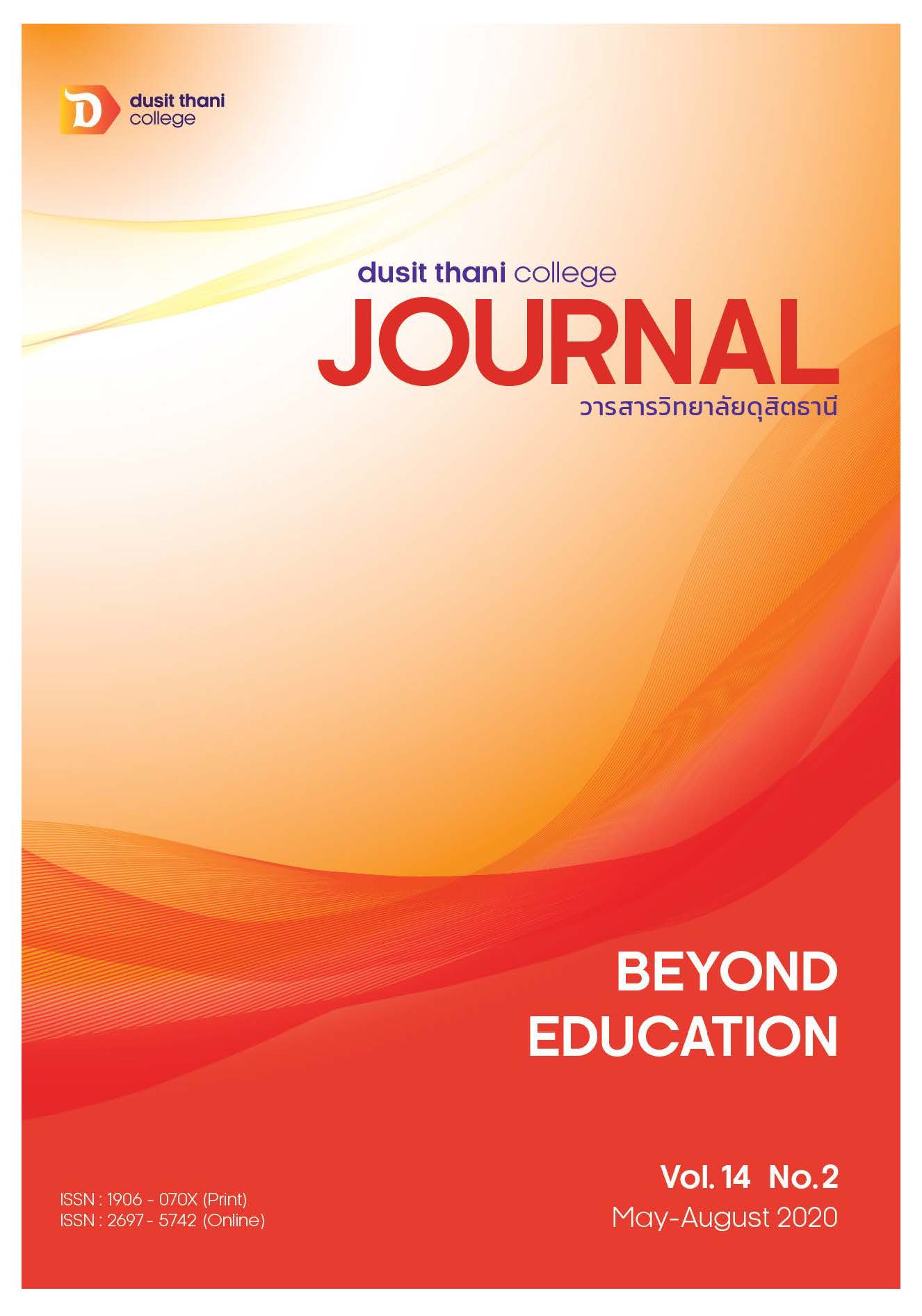Factors Affecting Learning and Innovation Skills in the 21st Century of the Students at the Dusit Thani College
Main Article Content
Abstract
The purpose of this study were: 1) To study the learner factor, teacher factor, friend factor and Instructional Media factor 2) To study the level of learning and innovation skills in the 21st century. and 3) To study the factors affecting the learning and innovation skills in the 21st century. The Samples were 230 freshmen who were selected by Multi-Stage Random Sampling and the instrument was a questionnaire. The statistical methods that were used in this research were percentage, mean, standard deviation, analyzing Pearson’s product moment correlation coefficient and analyzing stepwise multiple regression. The results found that: 1) The learner factor, teacher factor, friend factor and Instructional Media factor were at a high level. 2) The factors of learning and innovation skills in the 21st century was at a high level, and 3) The predictors of the learning and innovation skills in the 21st century of instructional media included three factors: Media factor (X4), Learner factor (X1), and Friend factor (X3) in which multiple correlation coefficient was found at 68.50 % with a statistically significant at level of .05. The regression coefficient predictive competence was found to be at 46.9%. These could be formed by a predictive equation of raw scores and standard scores as follows:
Y = 1.262 + .297X4 + .237X1 + .163X3
ZY = .348X4 + .277X1 + .240X3
Article Details
Article Screening Policy
- All research and academic articles to be published must be considered and screened by three peer reviews in the relevant field / article.
- All articles, texts, illustrations and tables published in the journal are the personal opinions of the authors. Editors don't always have to agree. And no responsibility whatsoever is the sole responsibility of the author.
- The articles to be published must never be published. Where did you first publish? And not in the consideration of other journals If the audit found that there has been a duplicate publication It is the sole responsibility of the author.
- Any article that the reader sees as being plagiarized or impersonated without reference. Or mislead the work of the author Please let the journal editor know it will be your greatest blessing.
References
Cole, P.G. and Chan, L. (1994). Teaching principles and practice. 2nd ed. New York: Prentice Hall.
Dusit Thani College. (2018). Student Handbook Dusit Thani College 2018. Bangkok:
Dusit Thani College.
Harnmontri, Sompit., Nethanomsak, Teerachai., & Poolpatarachewin, Chumpol. (2015). Curriculum framework for developing competency of Thai students in the future
(B.E. 2558-2577). Research Methodology & Cognitive Science. 13(1), 1-13.
Hair, J.F., Black, W.C., Babin, B.J., Anderson, R.E. & Andersen, R.E. (2010). Multivariate data analysis (Seventh edition). Upper Saddle River, New Jersey: Pearson Education, Inc.
Kesthanakorn, Patee. (2018). The Development of Indicators for 21st Century Students Skills,Faculty of Education, Kanchanaburi Rajabhat University.
Phetchabun Rajabhat Journal. 20(1), 97-107.
Komprom, Pantipa. (2008). Factors affecting learning skills of undergraduate students of faculty of education : a hierarchical regression analysis. Master of Education Program in Educational Research Department of Educational Research and Psychology,
Faculty of Education, Chulalongkorn University.
Kitrungruang, Worapoj & Chittarerk, Atip. (2011). 21st Century Skills: Rethinking How Students Learn. Bangkok: Openworlds.
Ma-oon, Raunmas. (2016). Efficient teaching and learning in higher education. Journal of Southern of Technology. 9(2), 169-176.
Nguyen Thi Thu Ha and Sirinat Jongkonklang (2018). A study of 21st century learning skills for high school students in Cao Bang Province, Vietnam. KKU Research Journal of Humanities and Social Sciences (Graduate Study), 6(2), 14-24..
Office of the Higher Education Commission. (2017). Guide to quality qssurance in higher education (3th ed.). Bangkok: Parbpim Limited Partnership.
Office of the Higher Education Commission. (2018). National educational standards 2018. (Online). Available from: http://www.ratchakitcha.soc.go.th/DATA/PDF/2561/E/199/ T19.PDF. (March 20, 2019).
Office of the National Economic and Social Development Council. (2019). The twelfth National Economic and Social Development Plan (2017-2021). (Online). Available from: https://www.nesdb.go.th/ewt_dl_link.php?nid=6422. (March 20, 2019).
Paiwithayasiritham, Chaiyos. (2014). A factor analysis of learning and innovation skill in the 21st century student teachers. Bangkok: Silpakorn University.
Panich, Vicharn. (2013). Enjoy learning in 21st century. Bangkok: Sodsri-Saritwong Foundation.
Phuttasorn, Ekkachai. (2010). Trends in the enhancement of the 21st century learning skills for adult learners. Master of Education Program in Non-Formal Education,
Department of Lifelong Education, Faculty of Education, Chulalongkorn University.
Sattrapruek, Soodchalerm. (2017). Flipped classroom in 21st century learning for development of learning and innovation skills. Academic Services Journal, Prince of Songkla University. 28(1), 100-108.
Soisakul, Patcharee. (2016). Developing the 21st century skills for vocational dtudents in the private vocational institutes in Eastern seaboard area. Educational Administration, Educational Faculty, Burapha University.
Thanormchayathawat, Benjawan., Vanitsuppavong, Pongsr., Niemted, Wuttichai. (2016). 21st century skills: A challenge for student development. The Southern College Network Journal of Nursing and Public Health. 3(2), 208-222.
Turner, amolrat., Leungratanamart, Ladda., Niranrat, Saran., Jarnarerux, Jiraporn., Wattanakull, Boontuan & Reunreang, Tutiyarat. (2015). Twenty First Century Skills of Nursing Students of Boromarajonani College of Nursing, Chonburi. Nursing Journal of the Ministry of Public Health. 25(2), 178-193.
The Partnership for 21st Century Skills. (2011). C21 Framework Definitions. (Online).
Available from: http://www.p21.org/storage/documents/P21_Framework_ Definitions.pdf. (April 30, 2019).
Trilling, B., & Fadel, C. (2009). 21st Century Skills : Learning for Life in our Times. San Francisco, CA: Jossey-Bass.


